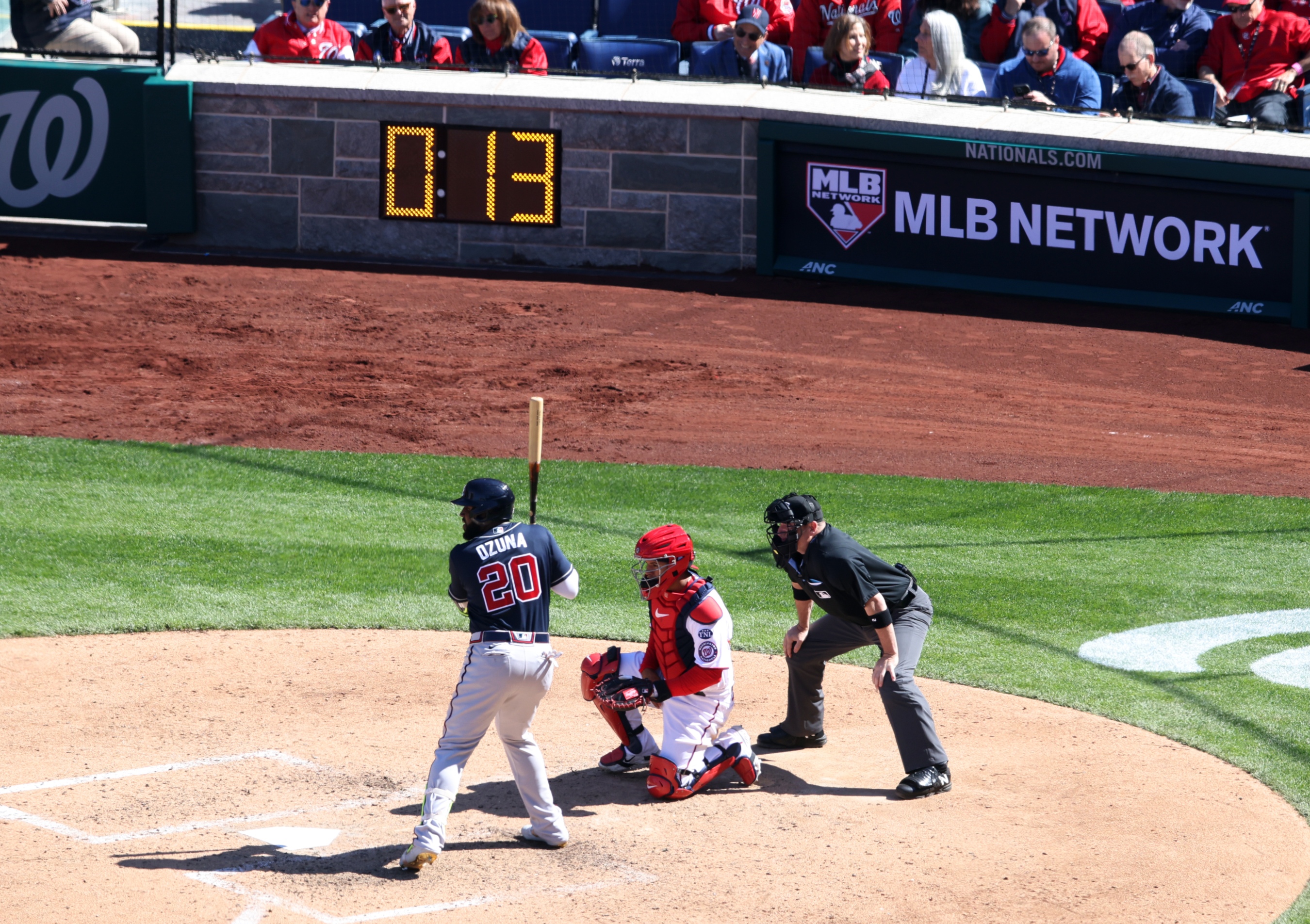Pitch Clock Reduces 2023 Opening Day Games By Average of 26 Minutes


Image credit: Pitch Clock (Photo by Rob Tringali/MLB Photos via Getty Images)
LOS ANGELES — It took just one day for the pitch clock to make its impact felt across Major League Baseball.
The average game time was 2 hours, 45 minutes on Opening Day, the first day of regular season games with the pitch clock in effect. Ten of the 15 games played lasted less than three hours.
Last year, with seven games played on Opening Day, the average game time was 3:11—26 minutes longer.
“It’s great,” Dodgers manager Dave Roberts said following his team’s 8-2 win over the D-backs. “That was front of mind actually looking at (our) game and going ‘Man, we played 2:35 tonight.’ Last year it was probably 3:35.”
The opening contest between the Dodgers and D-backs served as a microcosm of the pitch clock’s impact. The game featured 10 runs, 16 hits, 20 strikeouts, four mid-inning pitching changes and a lengthy delay after D-backs reliever Kevin Ginkel was called for a pitch clock violation for coming set before the hitter was ready.
The game still concluded in 2:35.
About 120 miles south, Padres lefthander Blake Snell needed 93 pitches to get through 4.1 laborious innings against the Rockies. The teams went on to combine for nine runs, 24 hits, four errors and 27 strikeouts in a game that no one will remember for its crispness.
The game still took just 2:56.
On a day when all 30 teams played, every game concluded by 9:55 p.m. Pacific Standard Time.
“It’s good,” Dodgers outfielder David Peralta said. “That’s the way it’s supposed to be. We get in pretty quick and we have more time to rest.”
The shortest of last year’s Opening Day games was 2 hours, 49 minutes. Nine of the 15 games on Opening Day this year were faster.
Last year, six of the seven games played on Opening Day exceeded three hours. This year, only five out of 15 exceeded three hours.
That isn’t to say everything went off without a hitch. There were 14 pitch clock violations on Opening Day, an average of just under one per game. Eight violations were called on pitchers, five were called on hitters and one was called on a catcher. Red Sox third baseman Rafael Devers became the first hitter to be called out on strikes for a pitch clock violation.
But none of the worst-case scenarios occurred. No games were decided in the ninth inning on a pitch clock violation. No runs were forced home because of one. And even with the violations pausing the action, games were still an average of 26 minutes shorter compared to Opening Day a year ago.
“I think we’re used to it by now,” said Dodgers rookie outfielder James Outman, who also played with the pitch clock at Triple-A last year. “ … Being able to do it in the spring, I think everyone’s used to it for the most part. There’s obviously going to be hiccups here and there, but I thought we did a good job of getting in the box on time and getting the pitch off on time.”
While it was just one day, and an early-season one with teams throwing their best starters at that, Thursday’s results nonetheless marked another promising data point in MLB’s pursuit of shorter game times.
MLB introduced the pitch clock at Low-A West in 2021 and saw the average time of nine-inning games shortened by 21 minutes. It expanded the pitch clock to all levels of the minors in 2022 and saw the average game time decrease by 25 minutes. In advance of instituting the pitch clock for the 2023 regular season, MLB introduced the pitch clock in spring training this year and saw average game times decrease 26 minutes compared to 2022 spring training.
Now, on the first day of the pitch clock in the MLB regular season, the average game time decreased 26 minutes compared to Opening Day the year prior.
The average time of a nine-inning game in a full season has not been under 2:45 since 1986. It has not been under 2:50 since 2006.
If current trends continue with the pitch clock, MLB will find itself coming in under both thresholds in 2023.
“I think for all of us, we’re all going to be looking forward to some more baseball tomorrow and it’s just not that much of a grind,” Roberts said. “I applaud Major League Baseball. We’re trending the right way.”
| 2023 Opening Day Game Times | |
| Game | Time (in minutes) |
| CWS-HOU | 158 |
| NYM-MIA | 162 |
| MIN-KC | 152 |
| TOR-STL | 218* |
| CIN-PIT | 182 |
| PHI-TEX | 184 |
| DET-TB | 134 |
| MIL-CHC | 141 |
| BAL-BOS | 190 |
| SFG-NYY | 153 |
| ATL-WAS | 187 |
| CLE-SEA | 134 |
| LAD-AZ | 155 |
| COL-SD | 176 |
| LAA-OAK | 150 |
| Average | 165 |
| *Includes 12-minute delay | |
| Source: MLB.com | |
Editor’s Note: The time of game calculation has been updated to include the 12-minute delay in the Cardinals-Blue Jays game. It previously excluded the delay.

Comments are closed.